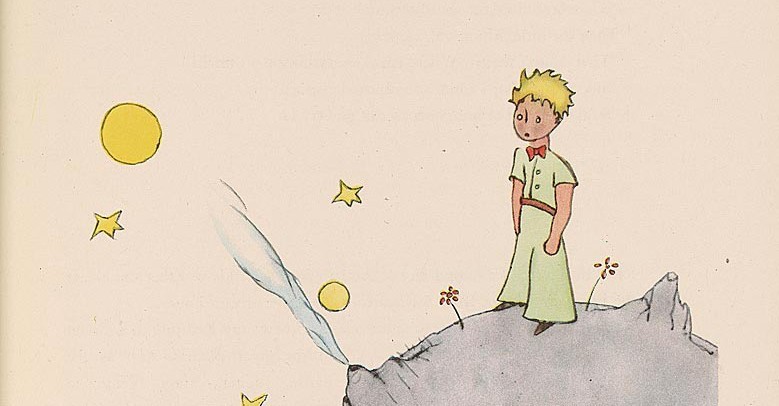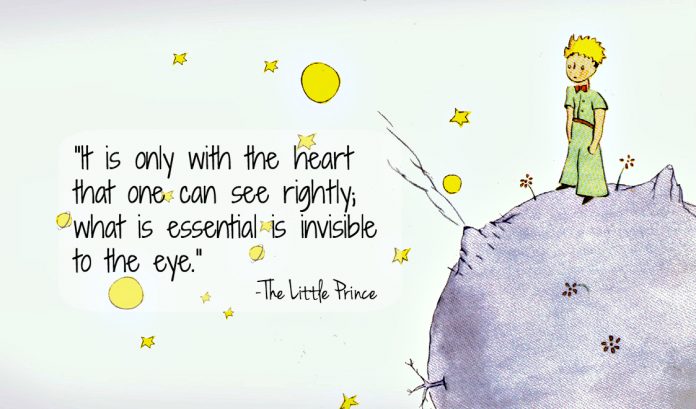On the feast day of the Patron Saint of priests, St. John Marie Vianney, who is a Frenchman, I am reminded of that little book written by another French man. I am referring to Antoine de Saint Exupery and his well-loved book entitled, The Little Prince.
Those of you who have already read this book will know that, although it looks very much like a book for children, it is actually written for adults, especially those who have somehow lost the child in them.
The story is about a little boy whom the narrator calls “The Little Prince,” and whom he supposedly met in the desert when he, as a pilot, crash landed his little plane in the Sahara.
He writes about this newfound friend, and about the strange requests that the boy was making on their first encounter, like asking him to draw him a sheep. How this little boy, dressed like a prince, kept him company in his solitude in the desert, telling him stories about the strange characters he had encountered in the other planets which he had visited during his journey. How he described most of them as adults who acted strangely. How he found them all too busy with things they considered of utmost importance, but which the Little Prince simply found ridiculous.
He spoke for example about a king with no subjects, and who commanded the sun to rise at sunrise and to set at sunset. He also told of a man who claimed to be the most admirable person on a planet where nobody else lived, and a businessman who did nothing everyday except count the stars, claiming that he “owned” all of them.
He said they had only one thing in common: they were all grownups who were too preoccupied about “matters of consequence.”
He also spoke of his disappointment when he saw a whole row of rosebushes and realized that contrary to his belief, the one precious and sensitive rose in his planet was not the only one in the whole universe.
It was then that he met the fox who taught him about the ritual of taming and became his friend. And how this fox gave him a secret: namely, that “It is only with the heart that one can see rightly; what is essential is invisible to the eye.”
This happens to be the most quoted line in the book and has become so trite and so cliche because beauty queens have over-quoted it in beauty contests. I wonder who else in today’s Philippine society Exupery would have added among the ridiculous grownups whom he described.
In today’s Gospel, we hear of similar characters in the Pharisees whom Jesus describes as “blind leaders of the blind.” They are so obsessed, he says, with the trappings and the non-essentials of religion. They pass on as doctrine all sorts of rules and regulations that have totally lost any relevance or meaning.
Perhaps we can compare them to kids who buy a piece of candy because they find its the wrappings attractive. They unwrap the candy, throw away the content and eat the plastic wrapper.
Some literary critics tell us Exupery must have had Jesus in mind when he created his Little Prince character.
In many instances in the Gospels, we hear Jesus speaking very much like the little prince character, such as when he reacts to some traditions of ritual purity which he finds utterly ridiculous. He says, “It is not what you put into your mouth that can make you impure, but rather what comes out of your mouth.”

Sometimes I also wonder if Exupery also had in mind his fellow Frenchman, St. John Marie Vianney, who remained very childlike, even in his adult life and ministry.
John Vianney, like the Little Prince, called attention to the same things: the foolishness and superficiality of many of the endeavors and concerns of the people during his time. He invited them to return to the essentials, to be able to see what truly mattered about faith: a heart disposed to love God above all, and love one’s neighbor as oneself.
How sad it is when people who spew out nothing but trash from their mouths and their actions are even idolized in their blindness and imitated by their blind followers. They do not realize that the filth that comes out of a foul mouth is emanating from a rotten core. As they say in Latin, “Ex abundantia cordis os loquitur.” (Out of the abundance of the heart, the mouth speaks.)
This is also what the prophet Jeremiah is calling attention to in our first reading. “There is remedy for ulcer, but no healing for you.” He tells the people of Judah straight to their faces that they were being struck down because they had become rotten to the core. But he ends with a hopeful note that what seems like punishment to them is really God’s way of reforming them, of remolding them like clay in a potter’s hands. He is recreating them, he says, this time after his own core, to be a people of a new covenant.
Here is his prophecy: “A new ruler shall emerge from among them, a fresh leader in their midst. Because he is afraid to approach me, I myself will draw him close to me. Then you shall indeed be my people and I shall be your God.”
This is the homily of Bishop Pablo Virgilio David of Kalookan for Tuesday, August 4, 2020, 18th Week in Ordinary Time, Feast of St John Marie Vianney. Bishop David is the acting president of the Catholic Bishops’ Conference of the Philippines.









